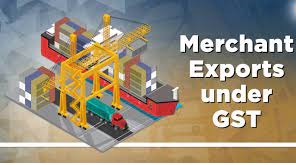As of my knowledge cutoff in September 2021, the Goods and Services Tax (GST) is a comprehensive indirect tax levied on the supply of goods and services in India. However, please note that tax regulations and policies are subject to change, so it’s always a good idea to consult the latest information or a tax professional for the most up-to-date guidance.
Under the GST regime, merchant exports are considered zero-rated supplies. This means that the exports of goods or services are not subject to GST. The purpose behind zero-rating merchant exports is to ensure that the exported goods or services remain competitive in the international market.
To avail of the benefits of zero-rated supplies for merchant exports, certain conditions must be met. These conditions may include fulfilling documentation requirements, providing proof of exports, and adhering to specific procedures outlined by the GST authorities.
It is important to note that while the merchant exports themselves are not subject to GST, any input taxes paid on inputs or input services used in the manufacturing or provision of those goods or services can be claimed as a refund or utilized as a credit against future GST liabilities. This allows exporters to avoid the cascading effect of taxes and promotes the competitiveness of Indian goods and services in the international market.

Meaning of Merchant Exporter
A merchant exporter refers to an individual, company, or entity that is engaged in the export of goods or services. Merchant exporters purchase goods from domestic suppliers and then export them to foreign markets. They act as intermediaries between domestic suppliers or manufacturers and international buyers.
Merchant exporters typically take title or ownership of the goods they export before selling them to overseas customers. They may also handle various activities involved in the export process, such as packaging, documentation, transportation, and logistics. In some cases, merchant exporters may modify or customize the products to meet the specific requirements of foreign buyers.
Merchant exporters play a crucial role in international trade by facilitating the movement of goods from the domestic market to foreign markets. They help in bridging the gap between the suppliers/manufacturers and the overseas buyers, providing a link in the global supply chain.
It’s important to note that the term “merchant exporter” may vary slightly in different countries or regions. The definition and specific responsibilities can depend on local regulations and trade practices.
Conditions for Merchant Exporter:
Business Registration: The merchant exporter should have a valid business registration, such as a company registration or proprietorship/partnership registration, depending on the legal structure of the business.
Import-Export Code (IEC): The merchant exporter must obtain an Import-Export Code from the relevant government authority. The IEC is a unique identification number required for carrying out export activities.
GST Registration: Depending on the country’s taxation system, the merchant exporter may need to register under the Goods and Services Tax (GST) or any other applicable tax regime.
Compliance with Export Regulations: The merchant exporter must comply with export regulations, including any licensing or permit requirements for specific goods or destinations. They should also be aware of any restrictions or embargoes on certain products.
Process of Merchant Exporter:
Identify Products: The merchant exporter selects the products or services they intend to export based on market demand, quality, and competitive pricing.
Supplier Identification: The exporter identifies domestic suppliers or manufacturers from whom they can source the products. Negotiations are conducted to determine pricing, quantity, and other terms.
Procurement and Quality Control: The merchant exporter procures the goods from domestic suppliers and ensures that the products meet the quality standards specified by the international market.
Packaging and Documentation: The exporter arranges for appropriate packaging of the goods, adhering to international packaging standards. They also prepare the necessary export documentation, such as commercial invoices, packing lists, certificates of origin, and any other required documents.
Transportation and Logistics: The merchant exporter arranges for the transportation of the goods from the domestic location to the port of shipment. They may engage shipping agents or freight forwarders to handle the logistics, including customs clearance and freight arrangements.
Export Customs Clearance: The goods are presented to customs authorities for export customs clearance. The exporter ensures compliance with all customs formalities and documentation requirements.
Shipment and Insurance: The goods are loaded onto the chosen mode of transportation, such as a ship, plane, or truck. The merchant exporter may obtain export insurance to safeguard against any loss or damage during transit.
Payment and Settlement: The exporter receives payment from the overseas buyer as per the agreed terms and conditions, such as advance payment, letter of credit, or other payment mechanisms. They handle the necessary banking procedures to settle the export transaction.
Post-Export Documentation: The merchant exporter completes any post-export documentation, such as submitting proof of export, filing claims for export incentives or refunds, and maintaining records of export transactions for future reference.
It’s important to note that this is a general overview, and the specific details and requirements may vary based on the country, product, and trade agreements in place. Merchant exporters should consult local trade authorities, and export promotion councils, or seek professional advice to ensure compliance with all the relevant regulations and procedures.
Since tax laws can change over time, I recommend referring to the latest information provided by the Indian tax authorities or consulting a tax professional for the most accurate and up-to-date guidance regarding GST on merchant exports.